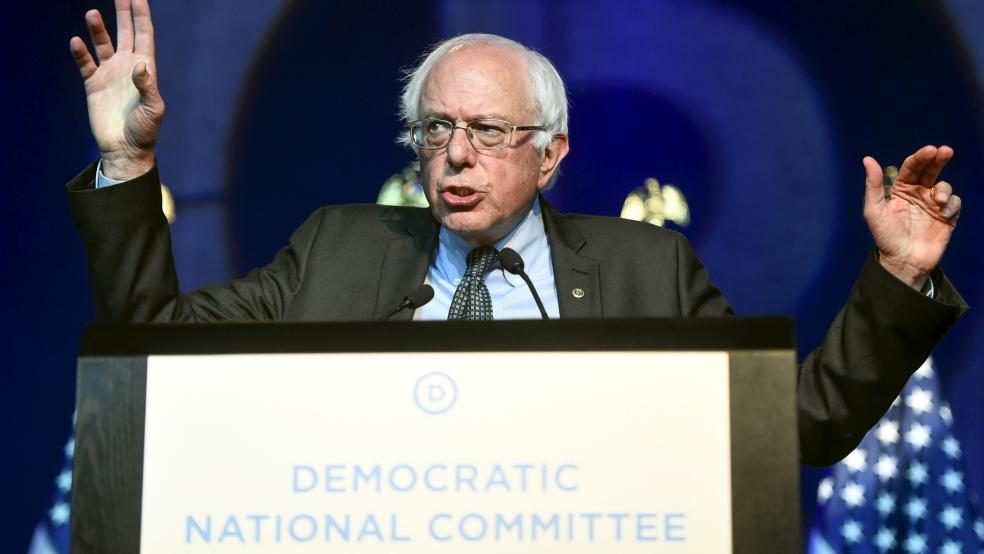Surging Democratic presidential candidate Bernie Sanders has vowed to step up his attack on the “outrageous profits” of pharmaceutical companies by introducing legislation in the Senate next week to allow Medicare officials to negotiate lower prescription drug prices for seniors.
According to a 2013 study by the Center for Economic and Policy Research, the federal government could save as much as $541 billion over the coming decade by negotiating for lower drug prices similar to those paid in other industrialized countries.
However, as part of the landmark Medicare Part D prescription drug program enacted in 2003 during the administration of President George W. Bush, Medicare was prohibited from negotiating drug prices, setting prices or establishing uniform lists of covered drugs.
Related: Drug Company Profits Soar as Taxpayers Foot the Bill
Americans are paying the highest prices for prescription drugs in the world, Sanders noted in a recent blog post. Just last year, drug prices jumped by 12.6 percent, according to the Centers for Medicare and Medicaid Services. That increase was more than twice the rise in overall medical costs.
The pharmaceutical industry says that those price increases reflect the high cost of research and develop and that critics often fail to take into account the advances being made in treatment.
Sanders – who currently leads Hillary Clinton in the polls in New Hampshire and trails her by only seven points in Iowa -- has been hammering away at the problem of higher drug prices for consumers and government agencies for the past year. He launched an investigation with Rep. Elijah Cummings (D-MD) into recent spikes in generic drug prices.
“Americans should not have to live in fear that they will go bankrupt if they get sick,” Sanders wrote on Huffington Post on Tuesday. “People should not have to go without the medication they need just because their elected officials aren’t willing to challenge the drug and health care industry lobby … Between our government's unwillingness to negotiate prices and its failure to effectively fight fraud, it’s no wonder drug prices are out of control.”
Related: Cash-Strapped VA May Start Rationing Some Treatments
Sanders proposal would do the following:
- Instruct the Department of Health and Human Services to begin negotiating lower prices with drug companies doing business with the government under the Medicare Part D drug program.
- Permit individuals, pharmacists and wholesalers to import prescription drugs from licensed Canadian pharmacies.
- Require pharmaceutical companies to report information to the HHS Secretary that affects drug pricing. That would include the total cost claimed for research and development – a major factor in soaring drug prices – and the portion of development expenses that are offset by tax credits or covered by federal grants.
- Require drug companies to provide price information regarding overseas sales of their products as well as sales to federal agencies in order to provide greater transparency in assessing whether Medicare and other federal agencies are getting a fair shake.
- Restore the minimum rebate on drugs covered under Medicare Part D for low-income Medicare beneficiaries. That provision eliminated with the creation of the Part D program would save $103 billion over a decade, according to a Congressional Budget Office projection.
Sanders’s proposed legislation would be accompanied by tough penalties for violations of its provisions or fraudulent activities, including termination of any remaining “market exclusivity period” for any drug product found to be in violation of criminal or civil law.
Related: Medicare’s Budget Busting $4.5 Billion for Hep-C Drugs
A recent Kaiser Health Tracking Poll found that 76 percent of adults think that the top healthcare priority for Obama and the Republican-controlled Congress should be "making sure that high-cost drugs for chronic conditions, such as HIV, hepatitis, mental illness and cancer, are affordable to those who need them."
Related: The Life-Saving Drug That Almost No State Can Afford
The prohibition on Medicare negotiating over drug prices was a major concession by the Bush administration to the pharmaceutical industry – one that has prevailed for over a decade, despite repeated vows by President Obama to repeal the costly ban. Obama promised to change the law to allow Medicare officials to begin negotiating with drug companies to lower prices, but pulled back that promise in negotiating with pharmaceutical industry over the terms of 2010 Affordable Care Act.
Obama’s fiscal 2016 budget plan unveiled early this year proposed allowing the Secretary of Health and Human Services to negotiate prices for biotechnology treatments and other expensive drugs covered by Part D “to ensure access to and affordability of these treatments.”
However, that proposal has gone nowhere on Capitol Hill. The drug industry’s chief lobbying arm, Pharmaceutical Research and Manufacturers of America, charged that Obama’s budget plan would harm the Medicare Part D program and reduce patent protections on some drugs, according to Reuters.
Drug costs loom as a key issue in the 2016 Democratic presidential campaign, along with college tuition debt, the environment and global warming, stagnant wages for the middle class and a raft of other concerns of liberal Democrats and the middle class. Clinton has repeatedly cited high drug costs as a problem and has said that Medicare must “drive a harder bargain negotiating with drug companies about the cost of drugs.”





